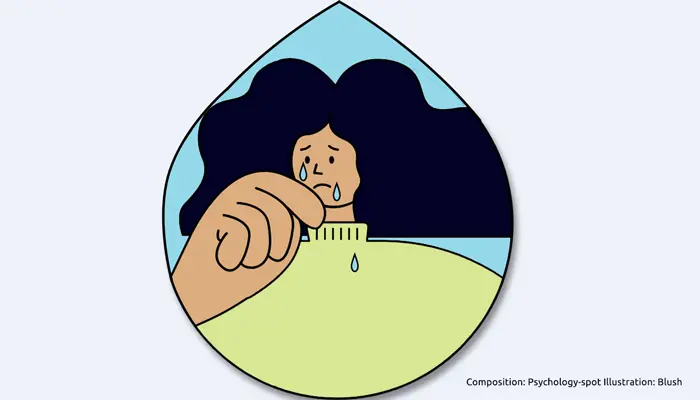
Crying is good for our well-being. It seems a paradox. For our perfectly logical and rational mind it may be difficult to conceive the possibility that crying, an act that we normally associate with sadness or frustration, may have some relation to well-being.
However, the tears that poets have praised so much and we often strive to repress and hide because not well viewed socially as they are related to weakness and vulnerability, may actually be more beneficial than we could imagine.
Crying connects us to the others
Crying is a very effective natural response to request care, attention and comfort from the others, as a study conducted at the University of Tilburg concluded. These psychologists discovered that people felt more connected to those who had a tearful appearance and perceived them as closer, friendlier and in need of help.
There is no doubt that sadness, and its most universal expression, tears, is an agglutinating emotion. When we are sad we are more vulnerable, it’s true, but that same vulnerability allows us connect better with the others to find the help we need.
That social support is very important for our well-being. That means that, in some cases, not crying and hiding our vulnerability behind a mask of strength and coldness can distance us from the others.
Of course, that doesn’t mean that crying is the only way to ask for help, but there is no doubt that it brings us closer to the others, especially when the affliction is great and there are no words to express it. We cannot forget that weeping turns us “naked” and that level of intimate exposure generates very close links with the people who are at our side.
In fact, it has been proven that the liberating cry is that which leads to a social relationship and serves as a “relational remedy”. When people cry in a cold environment or where there is no positive social interaction, crying usually worsens their mood as it causes embarrassment or shame.
Crying is cathartic
Repressing the emotions makes us unhappy. Emotions that aren’t expressed end up becoming entangled in the unconscious, from where they exert a negative influence that affects our well-being. Not being able to express our discomfort, sadness or frustration, feeling obliged to suppress the crying, can have a more negative effect than simply giving free rein to our emotions.
The philosopher Seneca had already said it when he affirmed that “There is no greater cause for crying than not being able to cry”.
In fact, a study conducted at Stanford University found that people who usually repress their emotions react in an exaggerated way to pressure and stress, with a greater increase in blood pressure than that experienced by anxious people. This tells us that this “apparent calm” is not really good for our mental balance.
On the contrary, psychologists from the University of South Florida analyzed the therapeutic effects of crying. The first thing they discovered was that 70% of people say that crying is comforting. At first they felt sad, then regained balance and then improved their mood considerably, a positive effect that lasted for about 90 minutes.
In fact, it is known that crying is composed of two phases: in the first one (when the crying starts) it has an activating effect through the increase of the heart rate but immediately afterwards (in the second phase) it has a calming effect reducing the respiratory frequency. It is also known that emotional tears contain high levels of stress hormones, which would also explain why they’re beneficial and even cathartic.
To this is added that when we finish crying, our mind is clearer, so by serene we will be able to analyze the situation from another perspective. This is because our emotions have been balanced and our rational mind is ready to take action.
Therefore, the next time you feel like crying, don’t hold back tears. Maybe that moment is all you need to recover your calm, see things from a different perspective or simply free yourself from the emotions that are affecting you.
Sources:
Vingerhoets, J. M. et. Al. (2016) The social impact of emotional tears. Motiv Emot; 40: 455–463.
Gračanin, a. et. Al. (2015) Why crying does and sometimes does not seem to alleviate mood: a quasi-experimental study. Motivation and Emotion; 39(6): 953-960.
Barraza, J. A. & Zak, P. J. (2009) Empathy toward strangers triggers oxytocin release and subsequent generosity. Ann N Y Acad Sci; 1167:182-189.
Hendriks, M.C.; Rottenberg, J. & Vingerhoets, J.J. (2007) Can the distress-signal and arousal-reduction views of crying be reconciled? Evidence from the cardiovascular system. Emotion; 7: 458–463.
Rottenberg, J.; Bylsma, L. M. & Vingerhoets, J. J. (2005) Is Crying beneficial? Current Research in Psychological Science; 17(6): 400-404.
King, A. C. et. Al. (1990) The relationship between repressive and defensive coping styles and blood pressure responses in healthy, middle-aged men and women. J Psychosom Res; 34(4): 461-471.



